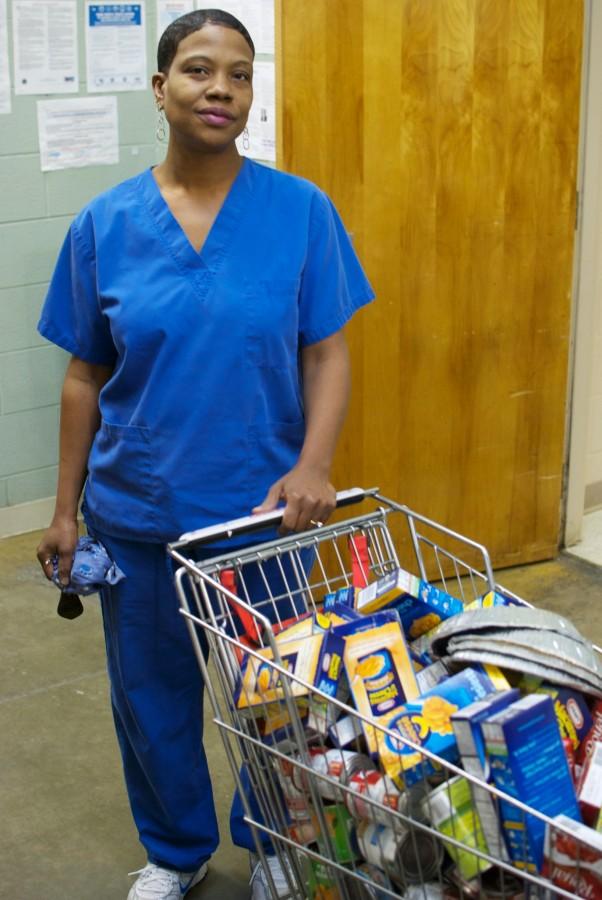Walk into the Caf and it’s all there for you: food. As much as we students might complain about the selection, those of us with a meal plan never have to worry about food.
Break that Guilford bubble, and that security disappears. A recent Food Research and Action Center report found that 25 percent of families in the Greensboro/High Point area struggle to feed themselves.
“That’s a shocking number,” said senior Kelsey Vergin, who interns at the Greensboro Children’s Museum’s Edible Schoolyard. “That’s a quarter — that’s huge. We think of families that can’t feed themselves as living in underdeveloped countries, but this is right here in Greensboro, and it’s one in four people.”
Additionally, Greensboro and High Point ranked fourth nationally in number of people who can’t afford food, according to the News and Record.
Though these numbers might be shocking to some, Katherine Shelton, the pantry director at the Servant Center’s Grocery Assistance Program, thinks the numbers might be worse.
“(A quarter) seems low,” Shelton said. “There are a lot of people they don’t know about. There are a lot of people — immigrants, people who use church (food programs) — who aren’t listed on formal paper.”
Others aren’t shocked either.
“Those of us that facilitate (free meals) have always been aware that many … who come to eat dinner may have not had an opportunity to eat a full meal that day and may not eat again until the morning,” said Saralee Gallien, an organizer for the Greensboro chapter of Food Not Bombs, in an email interview. “There’s a certain level of normalcy that sets in when you hang out with folks every week who do not have a normative eating schedule or any stable ability to secure three meals a day.”
Others have seen this problem growing.
“There’s been a considerable increase of people coming (to Greensboro Urban Ministry),” said GUM Food Bank Office Manager Val Marshall. “Not just to the food bank, but to the clothing bank, our beds, and Pathways, which is apartments for families.”
Some note that the problem goes beyond hunger.
“People buy less nutrition and more bulk,” said Shelton. “It fills people up, so they’re not hungry, but they’re not healthy.”
“Every community deserves the right to healthy food — not just food, but healthy food,” said Vergin. “But a burger costs $1 and a head of lettuce costs $3; people can’t afford the healthy option.”
According to Vergin, such issues arise from a food system based on feeding people as fast as possible and making money as fast as possible. Gallien blames systemic causes to a greater extent.
“FNB recognizes this struggle (with hunger) as conditions that are produced by capitalism and racism, which are two structural institutions this country was founded by and continues to operate through,” Gallien said.
Regardless of what the causes might be, there are ways students can help.
“A lot of college students volunteer to work with us over here,” Marshall said. “Students don’t have a lot of money, so we’d much rather have their time.”
Some volunteers mentioned the benefits of volunteering.
“I feel like I’m giving back and helping,” said UNCG freshman and GUM volunteer Caitlin Pantas. “I didn’t know about places like this before, so this has been a great learning experience.”
“The people here are terrific,” said first-year and GUM volunteer Eileen Martin. “I’m planning on continuing volunteering here even after my hours are done.”
Shelton suggested multiple ways students can help other than volunteering.
“Support local pantries; do food drives — they’re a tremendous help; grow a sustainable garden and learn how to do it organically,” Shelton said. “If we don’t get (the younger) generation involved, what’s going to happen?”
Vergin also mentioned similar ways to help. She also brought up self-education.
“(There should be) awareness — don’t be ignorant,” Vergin said. “People confuse (ignorance) with arrogance, but ignorance is just not knowing. Students here should allow themselves to know what’s going on, and understand our place of privilege.”

